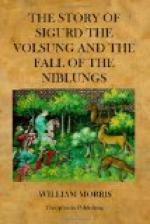But the slaves of the Kings
are gathered, and their host the battle
abides,
And forth in the front of
the Niblungs the golden Sigurd rides;
And Gunnar smites on his right
hand, and Hogni smites on the left,
And glad is the heart of Guttorm,
and the Southland host is cleft
As the grey bill reapeth the
willows in the autumn of the year,
When the fish lie still in
the eddies, and the rain-flood draweth
anear.
Now sheathed is the Wrath
of Sigurd; for as wax withstands the flame,
So the Kings of the land withstood
him and the glory of his fame.
And before the grass is growing,
or the kine have fared from the stall,
The song of the fair-speech-masters
goes up in the Niblung hall,
And they sing of the golden
Sigurd and the face without a foe,
And the lowly man exalted
and the mighty brought alow:
And they say, when the sun
of summer shall come aback to the land,
It shall shine on the fields
of the tiller that fears no heavy hand;
That the sheaf shall be for
the plougher, and the loaf for him that
sowed,
Through every furrowed acre
where the Son of Sigmund rode.
Full dear was Sigurd the Volsung
to all men most and least,
And now, as the spring drew
onward, ’twas deemed a goodly feast
For the acre-biders’
children by the Niblung Burg to wait,
If perchance the Son of Sigmund
should ride abroad by the gate:
For whosoever feared him,
no little-one, forsooth,
Would shrink from the shining
eyes and the hand that clave out truth
From the heart of the wrack
and the battle: it was then, as his gold
gear burned
O’er the balks of the
bridge and the river, that oft the mother turned,
And spake to the laughing
baby: “O little son, and dear,
When I from the world am departed,
and whiles a-nights ye hear
The best of man-folk longing
for the least of Sigurd’s days,
Thou shalt hearken to their
story, till they tell forth all his praise,
And become beloved and a wonder,
as thou sayest when all is sung,
‘And I too once beheld
him in the days when I was young.’”
Men say that the white-armed
Gudrun, the lovely Giuki’s child,
Looked long on Sigurd’s
visage in the winter weather wild
On the eve of the Kings’
departure; and she bore him wine and spake:
“Thou goest to the war,
O Sigurd, for the Niblung brethren’s sake;
And so women send their kindred
on many a doubtful tide,
And dead full oft on the death-field
shall the hope of their lives
abide;
Nor must they fear beforehand,
nor weep when all is o’er;
But thou, our guest and our
stranger, thou goest to the war,
And who knows but thine hand
may carry the hope of all the earth;
Now therefore if thou deemest
that my prayer be aught of worth,
Nor wilt scorn the child of
a Niblung that prays for things to come,
Pledge me for thy glad returning,
and the sheaves of fame borne home!”




